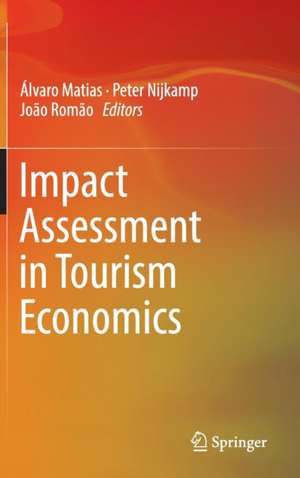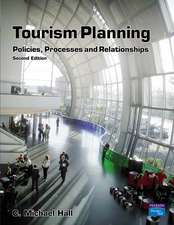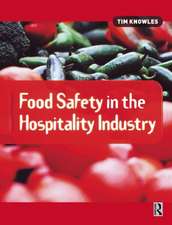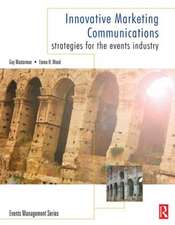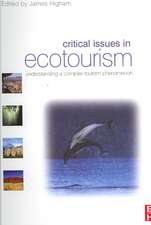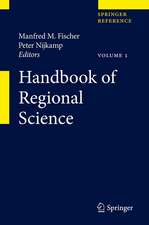Impact Assessment in Tourism Economics
Editat de Álvaro Matias, Peter Nijkamp, João Romãoen Limba Engleză Hardback – 9 mai 2016
This book presents a series of studies on the socio-economic impacts of tourism, with a special focus on the determinants of tourism competitiveness at the destination level. The authors offer a systematic overview of this important issue, presenting relevant empirical studies from different parts of the world, based on modern theoretical approaches and adequate analysis tools, in the context of their policy or managerial implications.
The first part of the book discusses the analysis and assessment of quantitative tourism impacts on local economies, while the second part focuses on non-material aspects of tourism development, in particular those related to the role of innovation and human resources. The final section highlights the different dynamics often observed in tourism destinations arising from the interaction between tourists and local communities.
| Toate formatele și edițiile | Preț | Express |
|---|---|---|
| Paperback (1) | 889.29 lei 6-8 săpt. | |
| Springer International Publishing – 26 mai 2018 | 889.29 lei 6-8 săpt. | |
| Hardback (1) | 895.27 lei 6-8 săpt. | |
| Springer International Publishing – 9 mai 2016 | 895.27 lei 6-8 săpt. |
Preț: 895.27 lei
Preț vechi: 1091.80 lei
-18% Nou
Puncte Express: 1343
Preț estimativ în valută:
171.33€ • 178.21$ • 141.44£
171.33€ • 178.21$ • 141.44£
Carte tipărită la comandă
Livrare economică 14-28 aprilie
Preluare comenzi: 021 569.72.76
Specificații
ISBN-13: 9783319149196
ISBN-10: 3319149199
Pagini: 350
Ilustrații: VI, 273 p. 28 illus., 18 illus. in color.
Dimensiuni: 155 x 235 x 21 mm
Greutate: 0.57 kg
Ediția:1st ed. 2016
Editura: Springer International Publishing
Colecția Springer
Locul publicării:Cham, Switzerland
ISBN-10: 3319149199
Pagini: 350
Ilustrații: VI, 273 p. 28 illus., 18 illus. in color.
Dimensiuni: 155 x 235 x 21 mm
Greutate: 0.57 kg
Ediția:1st ed. 2016
Editura: Springer International Publishing
Colecția Springer
Locul publicării:Cham, Switzerland
Public țintă
ResearchCuprins
Editorial Introduction.- Part I: Socio-Economic Impacts of Tourism.- Part II: Innovation and Competitiveness in Tourism.- Part III: Tourism Destination.
Notă biografică
Álvaro Matias is professor of economics at Lusíada University. His research interests have been increasingly directed towards tourism over the last decade. He has published extensively in peer reviewed journals and books, while actively engaging in organizing research events in tourism related areas.
Peter Nijkamp is professor of regional economics at the VU University in Amsterdam. He has a long standing career as a regional scientist with a broad interest in regional, urban, environmental and transportation issues. He has published numerous articles and books in all these fields.
João Romão is a researcher at CEFAGE (University of Algarve, Faro) and professor at Lusíada University (Lisbon). His work combines academic research and consultancy for private and public organisations in the fields of tourism, regional analysis and urban planning.
Peter Nijkamp is professor of regional economics at the VU University in Amsterdam. He has a long standing career as a regional scientist with a broad interest in regional, urban, environmental and transportation issues. He has published numerous articles and books in all these fields.
João Romão is a researcher at CEFAGE (University of Algarve, Faro) and professor at Lusíada University (Lisbon). His work combines academic research and consultancy for private and public organisations in the fields of tourism, regional analysis and urban planning.
Textul de pe ultima copertă
This book presents a series of studies on the socio-economic impacts of tourism, with a special focus on the determinants of tourism competitiveness at the destination level. The authors offer a systematic overview of this important issue, presenting relevant empirical studies from different parts of the world, based on modern theoretical approaches and adequate analysis tools, in the context of their policy or managerial implications.
The first part of the book discusses the analysis and assessment of quantitative tourism impacts on local economies, while the second part focuses on non-material aspects of tourism development, in particular those related to the role of innovation and human resources. The final section highlights the different dynamics often observed in tourism destinations arising from the interaction between tourists and local communities.
Caracteristici
Provides advanced statistical and econometric tourism modeling Includes new contributions to tourism impact assessment Illustrates regional and urban forms of tourism Includes supplementary material: sn.pub/extras
